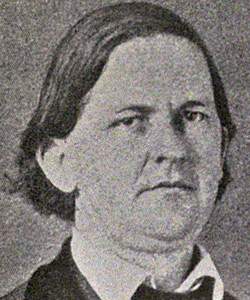Thomas Reade Rootes Cobb, Secession (American National Biography)
Scholarship
Despite his legal work Cobb is perhaps remembered more for his role in the secession of Georgia and for his contributions to the Confederacy. Cobb had been a moderate Unionist most of his life and had sought to promote the presidential aspirations of his brother Howell. By the late 1850s he had switched dramatically to become one of the most fiery supporters of secession in order to preserve the society he deemed sacred. He gave a widely circulated and influential speech to the Georgia Assembly in November 1860 in which he argued for and defended the right of secession. Separation was not only constitutional, he claimed, it was necessary because each section was made up of "a distinct people, having different social organizations, different pursuits, different memories, different hopes, different destinies." He spent the next few months speaking around Georgia, urging withdrawal from the Union. Privately he deprecated the timidity of those who wanted Georgia to secede only with other southern states, and when Georgia finally withdrew Cobb worked on the new state constitution. After he and his brother Howell were selected to serve in the provisional Confederate congress, he worked on the Confederate constitution as well.
Thomas D. Morris, "Cobb, Thomas Reade Rootes," American National Biography Online, February 2000, http://www.anb.org/articles/11/11-00174.html.
Thomas Reade Rootes Cobb, Legacy (American National Biography)
Scholarship
Cobb's greatest significance lay in his work in the law. He worked, from 1849 to 1857, as the reporter for the Georgia Supreme Court. He also argued cases in that court as well as in other southern courts. He was a driving force in the creation of a law school at the University of Georgia in 1859. An often overlooked part of his legal work concerned the codification of the law of Georgia. Codification was a highly controversial legal movement resisted vigorously by those steeped in the common law. It reduced basic but flexible common law principles to the more rigid language of statutes.
Thomas D. Morris, "Cobb, Thomas Reade Rootes," American National Biography Online, February 2000, http://www.anb.org/articles/11/11-00174.html.





